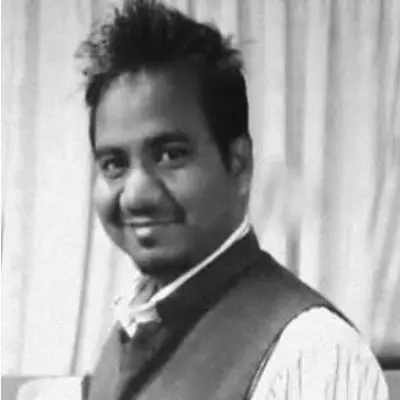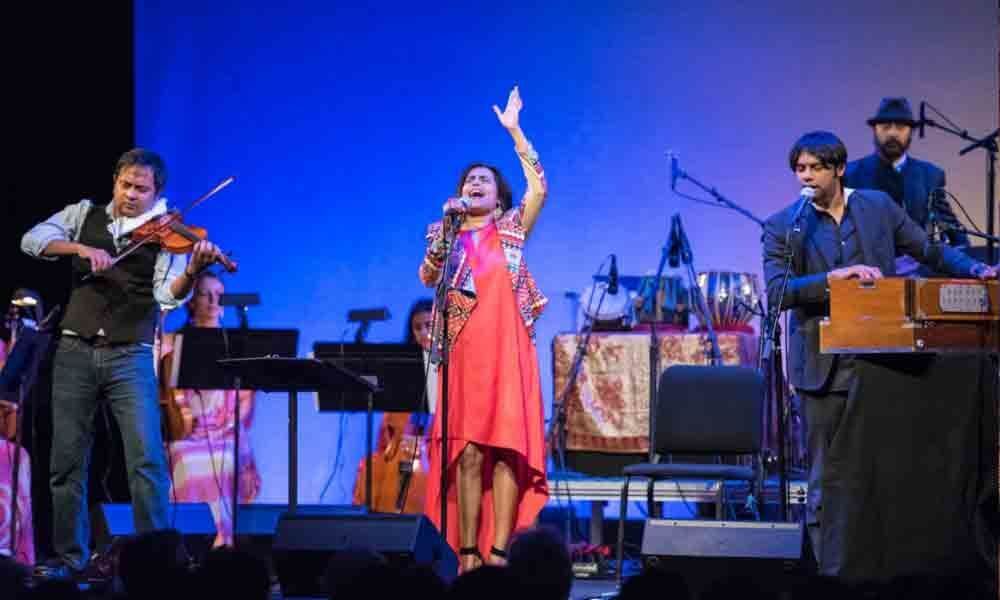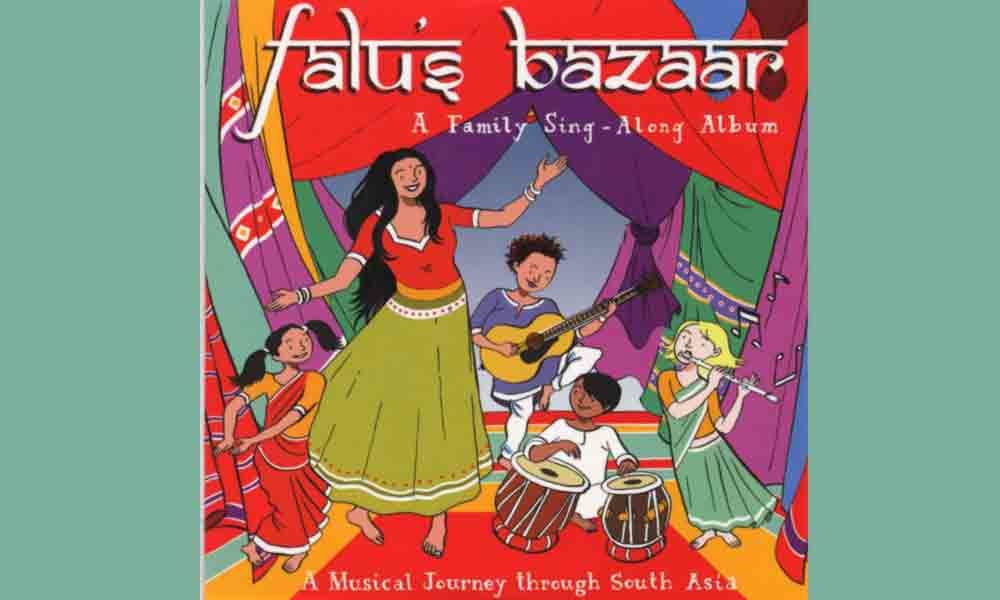Live
- Inflation burden eases for farm and rural labourers
- Delhi BJP releases 'chargesheet' against Kejriwal, AAP govt
- The First 40 Days: Sonnalli Seygall’s Thoughts on Traditional Postpartum Care
- CM Nitish Kumar embarks on Pragati Yatra from West Champaran, begins development drive in Bihar
- Rozgar Mela: Recruits from Patna, Panchkula express gratitude to PM Modi for appointment letters
- Tabling CAG reports: BJP legislators move Delhi HC for special Assembly sitting
- Allu Arjun Faces Legal Case; Minister Seethakka Criticizes Lack of Support for Victim’s Family
- Taiwan Excellence announces the Top 3 global winners for Go Green with Taiwan
- Delhi High Court Denies Bail to IAS Trainee Puja Khedkar Over Forgery and Fraud Charges
- BJP rejects Kharge’s charge on EC’s ‘erosion’, says ‘most changes brought during Cong rule’
Just In
Falguni Shah, popularly known as Falu, is a Grammy-nominated, internationally recognised artiste known for her rare ability to seamlessly blend a signature modern inventive style with a formidable Indian classically shaped vocal talent. In her early years in Mumbai, Falu was trained rigorously in the Jaipur musical tradition and in the Benares style of Thumri. Originally from Mumbai, Falu moved to the States in 2000 and was appointed as a visiting lecturer at Tufts University.
Falu's subsequent career in the States had led to a series of brilliant and high-profile collaborations with Yo-Yo Ma, Wyclef Jean, Philip Glass, Ricky Martin, Blues Traveler and AR Rahman amongst others. She was appointed Carnegie Hall's ambassador of Indian Music in 2006, where her shows at Zankel Hall have consistently sold out. Falu has performed for President Obama and First Lady Michelle Obama at the White House and was also the featured performer at the Time-100 gala in 2009. Falu continues to pursue her commitment to introducing children to the wonders of the world through her recently released, Grammy-nominated debut kids project, 'Falu's Bazaar', which takes families on a musical journey through South Asia, as well as through her artist-in-residence position at Carnegie Hall.
Falu has now been appointed as the Governor for the Grammy's Recording Academy. This is big as her role will be to collectively represent the Grammy community and be a voice of artists from all over the world.
Excerpts from an interview:
How did 'Falu's Bazaar' happen?
When my son turned 4, he started asking me questions after coming home from school – 'Ma, why is our food yellow? Why do we speak a different language at home versus school? Why do we count our numbers differently?' I felt that he needed to be assured about his roots and his identity and his own culture.
As a musical family, I then thought there is no better way to answer all his questions than through song, so I started writing and singing for him. Anytime we would cross the road or start talking about the different shapes in Hindi and English, or how to count numbers or name colours in two languages, songs would evolve organically. Sometimes it would come up while playing together or taking him around on an NYC city bus where I taught him to greet people in various languages. If we met someone from China, he would spontaneously say 'Nihao!' Same with Spanish - he would greet the person with 'Hola!' All of which led us to the fourth song in the album, 'Hulululu Bus'. My son would also play in the kitchen while I would cook, and every 10 minutes would ask me about the name of this pot, or a roller and I would say the words in Hindi. He would always want to sprinkle spices in my food, and I would show him our masala dabba and say, 'This is haldi, jeera, and mirchi, which gave birth to our spice and pots and pans.'
I started creating the theme of the album, which centres around an Indian child, who travels from his home to go to an Indian bazaar, and on his way to the bazaar, the child discovers so many new things and learns so much in two languages until he/she reaches his destination. In my mind, I was basically creating an Indian 'Dora the Explorer', which in my case was my son as the main character of my story.
Tells us about your role as Governor of Grammy's Recording Company
As a Governor, we help make important decisions within the board and form committees that oversee how all the departments work inside the organisation. We introduce new ideas to the board and try to make the right decisions that reflect and represents diversity all across the organisation.
When and why did you start singing?
I started singing at the age of 3 and because my mom sang, she spotted the talent in me when I was very young and really encouraged me to pursue music as my career.
What are your fondest musical memories?
There are many, but the ones that come to mind right away are when my mom and dad gave me my first bike when I was 4 years old after I practised for one hour straight. Every time they saw focus and hard work that I would put into music, I was awarded small gifts. I still cherish those moments. I loved the chocolate treat the Eclair, for example, which would keep me motivated and singing for a couple of hours!
How do you handle mistakes during a performance?
Oh! I remember my teacher once said that there are no mistakes on stage. You just can't afford to make one. Touch wood but I still try to follow that every time I perform.
How often and for how long do you practice?
I practice every day. In the early years, I would practice 16 hours a day! This regiment lasted for at least ten years. Now I still practice for a couple of hours every day. My teacher trained me very strictly and instilled this idea from early on – 'riyaz ke bina sona nahi' - and I follow that even now.
Please explain your creative process
Creativity comes in many shapes and forms. Sometimes I write a song in a grocery store or walking on the street, sometimes it comes on a piano, sometimes, when I wake up in the morning, the song is already composed in my head. I find I always have to be aware of what my thoughts are during the day and or night, as who knows where will the melody come from?
What do you enjoy most about being a musician?
I love singing and feeling the emotion that comes with it. Singing accesses my deepest feelings that I can't generally express. It gives me the courage to be vulnerable and dig them up and makes it easy to express those feelings. When people then feel what I feel, that connection is amazing.
What are the main inspirations for the lyrics you write?
There are many - relationships, nature, love, universe, day-to-day experiences, friendships, disagreements, longings and so much more. I am a very observant person, so I am always taking in the space and the people around me, and the lyrics just come out from there.
If you didn't become a musician what would you be doing now?
I would be in finance or the Wall Street world if I weren't a musician. I love following the stock market I find how unpredictable it is fascinating. I'm always looking at the stocks no matter which continent I'm in.

© 2024 Hyderabad Media House Limited/The Hans India. All rights reserved. Powered by hocalwire.com










